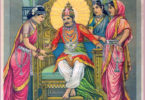Indian folklore and mythology is full of examples of deep-rooted friendships – Krishna and Sudama, Karna and Duryodhana, Akbar and Birbal, Rama and Sugreeva. Compilations like Panchatantra and Aesop’s fables contain many stories extolling the virtues of true friendship.
But apart from enlightening us about the importance of friends, some of these stories also convey a deeper meaning, one that people in this age need to learn – tolerance.
Akbar and Birbal – Kids of all ages love to list en to/read stories about the quick wit and intelligence of Birbal, the trusted Brahmin minister of the Mughal king Akbar. But the stories carry a lesson for grown-ups as well. Friendship goes beyond religion. It is the qualities, and compatibility between people that form the roots of a deep friendship.
en to/read stories about the quick wit and intelligence of Birbal, the trusted Brahmin minister of the Mughal king Akbar. But the stories carry a lesson for grown-ups as well. Friendship goes beyond religion. It is the qualities, and compatibility between people that form the roots of a deep friendship.
The Four Friends  and the Hunter: Panchatantra – Friendship does not necessarily have to be among likes. The story of the deer, mouse, crow and tortoise who manage to hoodwink a hunter and escape him shows that you need not be equals to be friends.
and the Hunter: Panchatantra – Friendship does not necessarily have to be among likes. The story of the deer, mouse, crow and tortoise who manage to hoodwink a hunter and escape him shows that you need not be equals to be friends.

The Lion and the Mouse: Aesop’s fables – The other person’s abilities and qualities may be diametrically opposite to yours, but that does not mean you cannot be friends, as is illustrated in the story of the lion and the mouse.
Krishna and Sudama – Class and caste do not hold any importance when it comes to friendship. Krishna and Sudama’s friendship, one that started out as kids, remained strong over decades, in spite of their starkly different economic backgrounds.
Sudama – Class and caste do not hold any importance when it comes to friendship. Krishna and Sudama’s friendship, one that started out as kids, remained strong over decades, in spite of their starkly different economic backgrounds.
(Images used from Creative Commons)




